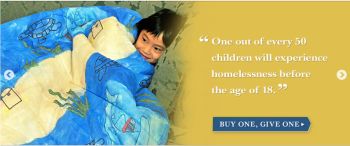By Danielle Thompson
There are more than 1.3 million children who will experience homelessness in their life. More specifically, one out of every 50 children will experience homelessness before the age of 18. The Company Store is a social enterprise that strives to end this epidemic by providing comforters to homeless children through a BOGO model, the buy one get one model. The Company Store is able to provide comforters because with every purchase of a comforter from its store, it will donate a comforter to a homeless child. In order to have a greater impact and have its comforters distributed, the Company Store partners with Family Promise, a non-profit dedicated to helping homeless families. The Company Store ships the comforters that it is donating to Family Promise, so it can reach the appropriate destination. Their assumption is that the child who receives the comforter will keep it with them until they have find a permanent home.
 I believe this social enterprise would be hard to replicate and is sustainable because it is very dependent on other organizations and people. For instance, the Company Store’s success and ability to donate comforters is through consumers. Consumers determine what is cool and trendy based on fads. If consumers no longer want to purchase comforters for themselves, then the Company Store wouldn’t be able to donate comforters. As a result, the whole enterprise would collapse and nobody would want to replicate its model. Furthermore, the Company Store relies on Family Promise to distribute its donations. If Family Promise shut down, then the donations of the Company Store would not reach its destination and it would be forced to close. Additionally, if one wanted to replicate its model, they would have to find a non-profit to partner with that would distribute its goods which is not an easy task. If the Company Store wants to be a replicable and sustainable social enterprise, it must learn to be more independent.
I believe this social enterprise would be hard to replicate and is sustainable because it is very dependent on other organizations and people. For instance, the Company Store’s success and ability to donate comforters is through consumers. Consumers determine what is cool and trendy based on fads. If consumers no longer want to purchase comforters for themselves, then the Company Store wouldn’t be able to donate comforters. As a result, the whole enterprise would collapse and nobody would want to replicate its model. Furthermore, the Company Store relies on Family Promise to distribute its donations. If Family Promise shut down, then the donations of the Company Store would not reach its destination and it would be forced to close. Additionally, if one wanted to replicate its model, they would have to find a non-profit to partner with that would distribute its goods which is not an easy task. If the Company Store wants to be a replicable and sustainable social enterprise, it must learn to be more independent.


